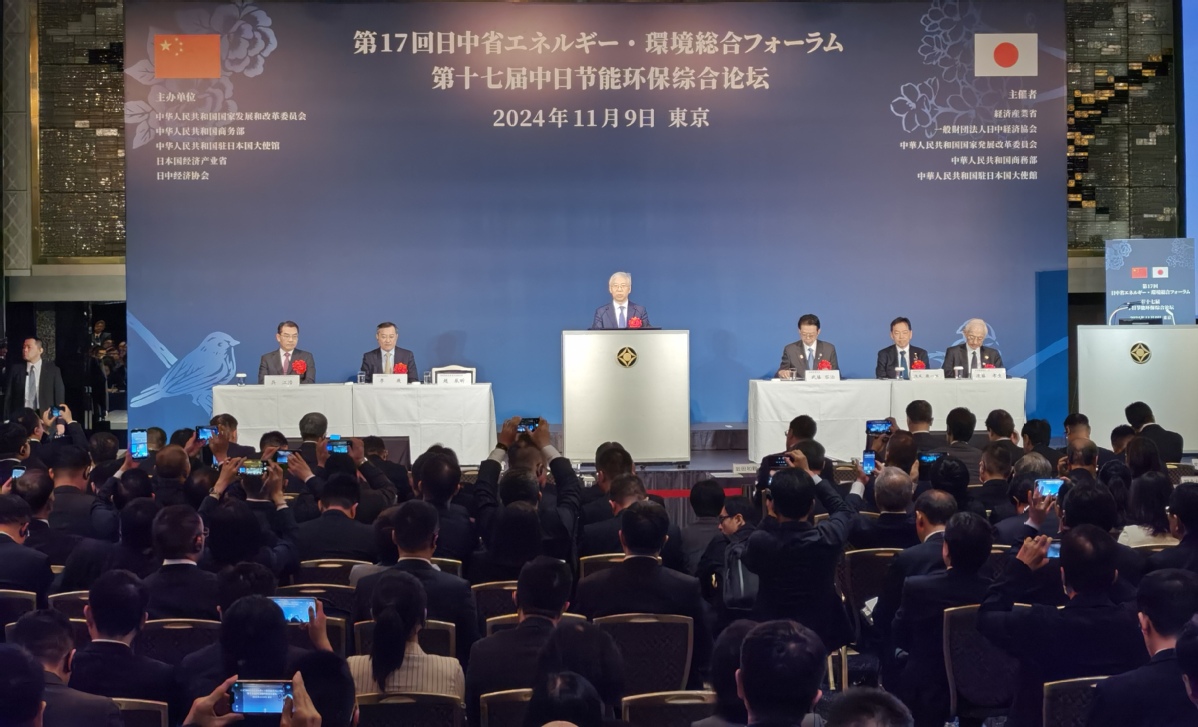China, Japan should identify new growth points for cooperation, Tokyo forum hears

China and Japan should make greater alignment in green development strategies, leveraging each other's comparative advantages and identifying new growth points for cooperation, officials from both countries said at a forum in Tokyo.
Speaking at the 17th China-Japan Comprehensive Forum on Energy Conservation and Environmental Protection on Saturday, Yoji Muto, Japan's minister of economy, trade and industry, stressed the importance of partnering with major nations for green, low-carbon transition.
READ MORE: China, Japan seek more collaboration in energy, environmental protection
He highlighted China's ambitious targets for peaking carbon emissions before 2030 and achieving carbon neutrality before 2060, which are driving key policies and rapid expansion in wind, solar and other renewable energy sources.
"The collaboration between Japan and China on energy conservation and environmental protection contributes significantly not only to the two nations but to global carbon neutrality efforts," said Muto.
He expressed hope that this forum would further strengthen Japan-China cooperation in energy conservation and environmental protection, fostering dialogue between the government and private sector representatives and inspiring additional collaboration.
Since 2006, the China-Japan Comprehensive Forum on Energy Conservation and Environmental Protection has held 17 sessions, resulting in 457 cooperative projects, including 27 new projects signed at this year's event. These new agreements cover areas such as waste-to-energy technology, decarbonization of industrial parks and environmental restoration.
During his meeting with Japanese Prime Minister Shigeru Ishiba last month, Chinese Premier Li Qiang expressed China's willingness to work with Japan in leveraging each country's advantages to identify new growth opportunities in green development.
At Saturday's forum, Zhao Chenxin, vice-chairman of China's National Development and Reform Commission, highlighted Japan and China's complementary industrial strengths, large market potential and solid foundation for cooperation in energy conservation and environmental protection.
Zhao underscored China's eagerness to boost cooperation with Japan in environmental industries, energy-saving equipment and environmental infrastructure, supporting joint demonstration projects and cooperation in third-party markets between organizations and businesses from both countries.
Low-carbon technologies
China also aims to deepen its partnership with Japan in green, low-carbon technologies, actively supporting academic discussions, technology exchanges and joint research while promoting the practical application of green technologies, Zhao said.
This initiative seeks to build a resilient, low-carbon industrial chain and an equitable, open trade and investment environment, further enhancing regional green development and contributing to global environmental governance, he said.
Japanese Environment Minister Keiichiro Asao said Japan and China together account for about 20 percent of the world's GDP, which gives them substantial influence on the global economy. Both countries play crucial roles in addressing global environmental challenges and sharing knowledge on climate change.
Japan has set a goal of achieving net-zero emissions by 2050, with plans to reduce greenhouse gas emissions by 46 percent from 2013 levels by 2030, aiming for a 50 percent reduction.
Asao stressed the importance of Japan and China setting ambitious, actionable emission-reduction goals. He said he hopes the forum would strengthen mutual understanding in energy conservation and environmental protection and further promote friendly bilateral relations.
Chinese Vice-Minister of Commerce Li Fei said China and Japan are companions and good partners in green development. He stressed the importance of multilevel and multifield policy communication to foster new growth points for green cooperation, advance practical project cooperation, and align green rules under regional multilateral frameworks to drive global governance reform and sustainable development.
Japan and China should actively facilitate green trade, jointly oppose protectionism and unilateralism, and resist new types of green barriers to promote the free flow of green products and technologies, he said.
China's high-quality production capacity in electric vehicles, lithium batteries and photovoltaic products contributes significantly to global green development, and it welcomes high-quality products from around the world, including Japan, to enter the Chinese market, supporting green growth across entire industrial chains, he added.
He also called on both countries to leverage their strengths and work alongside Global South countries in connecting markets and resources to jointly explore third-party markets in photovoltaics, wind power and electric vehicles, thus injecting positive energy into the global economic sustainability.
ALSO READ: Tokyo financial forum lays foundation for economic cooperation
Kosei Shindo, head of the Japan-China Economic Association, said the strong support from both governments encourages confidence in exploring new business opportunities between Japan and China, noting that maintaining this mechanism will be essential going forward.
Chinese Ambassador to Japan Wu Jianghao said energy conservation, environmental protection and green development are key areas for cooperation that the leaders of China and Japan highly value, with a solid foundation and promising outlook.
Global green transition depends on the widespread application of renewable energies and the deep integration of new energy vehicles, energy storage and energy-saving technologies, Wu said, adding it relies on a free, open and inclusive international trade system.
"Hyping up so-called overcapacity in the new energy sector, adopting unilateralist and protectionist measures, and creating exclusive supply chains to isolate specific countries will seriously hinder global economic and trade growth and slow down the global green transition," he said.
As major economies, China and Japan should jointly advocate an open and inclusive approach to cooperation, working together to maintain the global free trade system and stabilize supply and industrial chains, he said. This would create a fairer and more favorable environment for mutually beneficial collaboration between companies from both countries, he added.
jiangxueqing@chinadaily.com.cn


